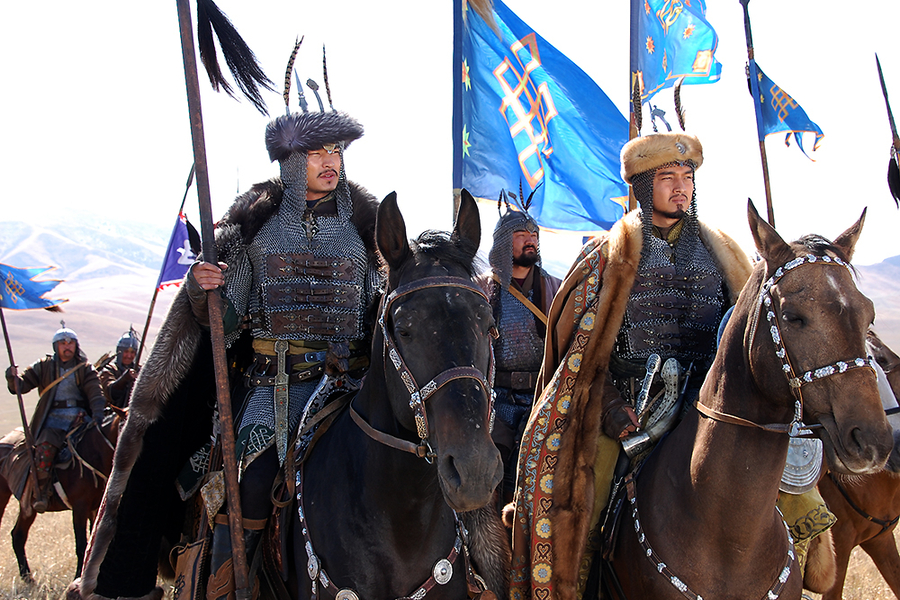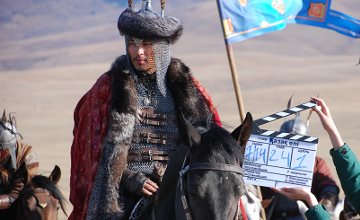ASTANA – Inspired by popular television series like “Game of Thrones,” “Genghis Khan” and “Magnificent Century” with thought-provoking screenplays, battle scenes and palace intrigue, the makers of “Kazakh Khanate” are eager to tell the world there were ancient towns, civilisations and centuries-old history that existed before independent Kazakhstan.
During initial production, the crew focused on “Genghis Khan,” the popular Chinese-Mongolian series about the life of the founder of the Mongol Empire.
“The Kazakh series talks about the empire that remained after the period of Genghis Khan. In a way, the disintegration of the Golden Horde in 1269 is not that dissimilar to the collapse of the Soviet Union in 1991,” said producer Arman Assenov in a recent interview for this story.
“Game of Thrones,” the American drama series, is different from the Kazakh historical one, noted the producer.
“‘Game of Thrones’ is very popular; the whole world is watching it… But the seven kingdoms in the series are fictional, unlike the real nations and kingdoms that existed on the Eurasian territory after the Golden Horde,” he said. He meant entities such as, the Blue Horde, also known as White Horde whose territory in mid-15th century was ruled by Khan Abulkhaiyr, the Kazakh Khanate, the Crimean, Astrakhan, Siberian and Kazan Khanates
“We wanted to tell our history to the whole world. Everyone thinks our nation is a very young, new state, when in fact it’s our 550th anniversary this year. We will celebrate 25 years of our independence, the forming of modern-day Kazakhstan this December,” said Assenov.
By the Dec.16 Independence Day celebrations, Assenov and his team plan to present 20 episodes of the series covering all periods of the khanate formation and first khans such as Zhanibek, Kerey and Kassym.
The team recently travelled to China as part of a government delegation and the nation is interested in the project.
“We spoke with the China Film Group company that purchases foreign content on China’s internal market and they were highly interested in our material,” noted the producer. “The company said they would surely buy our product for shows in 600 cinemas and three central television channels once it is ready.”
“Kazakh Khanate” will also air on Russian television channels like ORT and NTV. Doha-based broadcaster Al Jazeera also recently contacted the team, he added.
Assenov claimed the current complicated economic condition in the country did not have a significant effect on their work.
“Cinematography is a field of culture and entertainment; that’s why financial crises bypass it. Whatever the crisis is, people demand a show anyway,” he said.
By way of comparison, he added more films were produced in the Soviet Union during the Great Patriotic War than before the war began.
“When Great Britain was attacked, their Prime Minister at the time, Winston Churchill, was told that the war was starting and that reducing all expenditures, particularly on culture and except military costs, was needed. He replied ‘What are we fighting for if not for our culture?’ and on the contrary increased expenses for culture,” he said.
People need a sense of patriotism during war, which is why many countries frequently make films during difficult times.
“Crisis is not some kind of catastrophe; people still want to watch television and films. A film does not involve a great amount of financial resources,” he added.
Most importantly, the team wants to present the world with a powerful product about the history of nomadic civilisation.
“This historic period was undeservedly forgotten, as if it did not exist and we jumped straight from a primitive community to socialism and modern capitalism, when in fact there was this huge stratum of civilisation,” said Assenov.
Initially, people used to walk to do what they needed.
“The spreading of all religions on earth, people were walking and doing it… Then a man rode a horse. Great world conquests went on and people, mostly nomads, were doing it by riding horses and we were then proud to be able to ride it for some time,” he said.
Assenov feels the Genghis Khan Empire is a stratum of historic value that needs to be shown to the whole world.
The filmmakers want to tell how the process of forming a young Kazakh independent state progressed 550 years ago and the type of neighbours the Kazakhs had. Rich with battle scenes and palace conspiracies, the series promises to be very interesting to viewers.
Like “Genghis Khan,” the team focused “Kazakh Khanate” on the nomadic lifestyle and horses. Similar to “Magnificent Century,” the Turkish historical fiction series, it also has expensive costumes and jewelry.
“We also decided to use very expensive costumes and jewelry so that the Kazakh motif would become a trend in world fashion houses, like Turkish costumes and jewelry became popular after ‘Magnificent Century’ was released,” he said.
The Great Silk Road blossomed during the 15th century, passing through the present territory of Kazakhstan and allowing people to live a very prosperous and wealthy lifestyle.
“We also liked ‘Game of Thrones’ for its plot that fascinates with intrigues, twists and turns and main characters. That is why our screenplay is written deeply and thought through; every character has their own destiny and that makes ‘Kazakh Khanate’ and ‘Game of Thrones’ similar,” said Assenov.
With many poets, heroes and khans, Kazakhstan has a decent place among world cultures which he feels it must show to the world and occupy its niche in a global layer of cultural values.
“It is important that people think of Kazakhstan not only as ‘a hyper Astana’ mega polis and a brand, but also as a country of ancient towns, civilisations and many-centuries-old history. We are the descendants of the great Turks, Huns, Saks, Scythians and as we call ourselves today, Kazakhs,” said the producer.
These are the goals, tasks and commercial interests of the production team, which is confident it will earn money for its work. The world is interested in the series and with good and competent advertising people will buy and watch it, they believe.
“Our main task is to tell the world about our history; that for many years we were, we are and still will be,” said Assenov.


